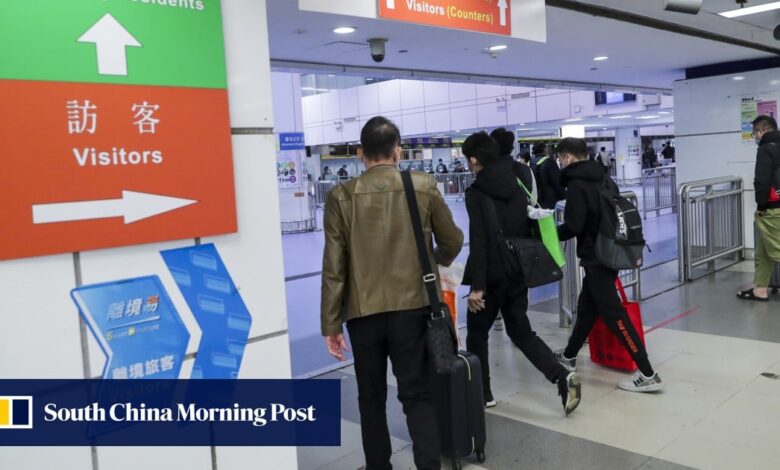Hong Kong policy address 2023: foreign business chambers welcome multi-entry visa to mainland China, but call for easier travel to Greater Bay Area

Foreign business chambers in Hong Kong have welcomed a multi-entry visa for mainland China unveiled in the city leader’s policy address, but have said more can be done to simplify travel to the Greater Bay Area.
The commerce groups were responding to Chief Executive John Lee Ka-chiu’s plan to offer foreign staff at overseas companies registered in Hong Kong a multi-entry visa to cross the border from Thursday.
Lee outlined the move in his policy address on Wednesday and said authorities wished to encourage more international companies to establish their headquarters in Hong Kong, with the government to shorten the processing time for such visas.
Foreigners staying in Hong Kong previously had to apply for a business visa to travel to the mainland, which required a letter of invitation from a trade partner over the border and a detailed itinerary.
Hong Kong to expand talent schemes to include Vietnam, Laos and Nepal
Hong Kong to expand talent schemes to include Vietnam, Laos and Nepal
Josephine Orgill, chair of the Australian Chamber of Commerce in Hong Kong, said the shake-up asserted the city’s position as a stepping stone into the mainland.
“The move demonstrates the city’s value as an international financial centre and helps reassert Hong Kong’s attractiveness as a unique gateway to the mainland,” she said.
Permanent residents from overseas can also apply for an APEC Business Travel Card for visa-free business travel to the mainland for up to 60 days. The document is valid for up to five years.
On the same day as Lee’s speech, the country’s foreign ministry office in Hong Kong announced that foreigners who are city residents can apply for multiple-entry visas valid for up to two years and cover business trips, family visits and tourism.
The city’s permanent residents from overseas can also obtain multiple-entry visas valid for up to five years, the ministry office said.
German Chamber of Commerce president Johannes Hack called the policy from Lee’s address a positive step in integrating with the mainland, but noted the multi-entry visa did not cover visitors employed by companies with headquarters in his native country.
He said making the documents valid for up to two years offered some benefits, but the substantial paperwork required to enter the mainland remained an issue.
“More often than necessary, the border crossing staff will ask us for documents, such as our itineraries or an invitation letter, even though we already have a visa, causing a lot of friction,” Hack said.
“It would be much more convenient if they could allow those of us with a [Hong Kong identity card] to cross the border at an automated channel. Such seamless travel into the Greater Bay Area could be a unique selling point of Hong Kong but we are not there yet.”
German nationals working in the sourcing, manufacturing and chemicals industries could cross the border up to three times a week to conduct business in Guangdong province, he noted.
‘Like a buffet’? Hong Kong’s John Lee serves many ‘dishes’ in policy address
‘Like a buffet’? Hong Kong’s John Lee serves many ‘dishes’ in policy address
Hong Kong’s European Chamber of Commerce said the policy change removed a “significant operational barrier” and hoped authorities could eventually allow business travellers to visit the Greater Bay Area using their Hong Kong identity cards.
The bay area refers to Beijing’s ambitious initiative to integrate Hong Kong, Macau and nine mainland cities into an economic powerhouse.
“We are also looking forward to more policy initiatives to enhance the connectivity between Hong Kong and mainland China, such as remote bank account opening, enhanced cross-border talent mobility and simplified cross-border e-commerce settlement,” the organisation said.
As it happened: Hong Kong halves non-resident buyers’ stamp duty in policy address
As it happened: Hong Kong halves non-resident buyers’ stamp duty in policy address
Ahead of Lee’s policy address, the American Chamber of Commerce in Hong Kong called for the city leader to make cross-border travel more efficient, such as offering broader use of self-service clearance channels, and said the city’s expat population had been largely neglected.
“Although cross-border travel for Chinese nationals has continually been made more efficient through technological advancements, the process remains slow and awkward for many of these others in Hong Kong, as they are unable to go through e-channels and must travel through regular immigration clearance,” the chamber said.
The business group had also urged local authorities to promote visa-free travel and work within the bay area for foreigners with permanent residency in Hong Kong and suggested basing the policy on the APEC Business Travel Card scheme.
Additional reporting by Connor Mycroft





